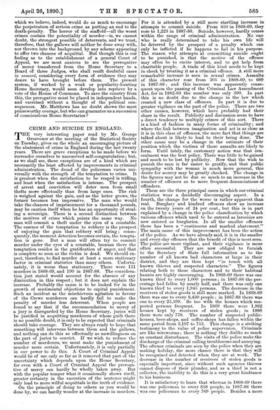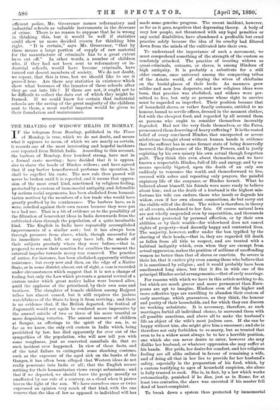CRIME AND SUICIDE IN ENGLAND. T HE very interesting paper read
by Mr. George Grosvenor at the meeting of the Statistical Society on Tuesday, gives on the whole an encouraging picture of the abatement of crime in England during the last twenty years. There are grave exceptions to be made before we surrender ourselves to unreserved self-congratulation ; but, as we shall see, these exceptions are of a kind which are necessarily the least affected by improvements in criminal administration. The dread of the policeman varies uni- versally with the strength of the temptation to crime. It is greatest when the satisfaction to be reaped is trifling, and least when the satisfaction is intense. The prospect of arrest and conviction will deter men from small thefts more effectually than from large ones. The risk is weighed against the gain, and as the latter grows, the former becomes less impressive. The man who would take the chances of imprisonment for a thousand pounds, may be caution itself when he has an opportunity of steal- ing a sovereign. There is a second distinction between the motives of crime which points the same way. No man will commit a theft under the eyes of a constable. The essence of the temptation to robbery is the prospect of enjoying the gain that robbery will bring ; conse- quently, the moment detection becomes certain, the tempta- tion is gone. But a man will often try to commit murder under the eyes of a constable, because there the temptation resides in the gratification of anger, and that is complete so soon as the victim is dead. We should ex- pect, therefore, to find murder at least a more stationary factor in criminal statistics than many others. Unfortu- nately, it is worse than stationary. There were 151 murders in 1868-69, and 190 in 1887-88. The considera- tion just stated would account for the absence of any diminution in this respect ; but it does not explain the increase. Probably the cause is to be looked for in the growth of sentimental objections to capital punishment. Such an incident as the mischievous agitation in favour of the Crewe murderers can hardly fail to make the penalty of murder less deterrent. When people are found to say that if the recommendation to mercy of a jury is disregarded by the Home Secretary, juries will be justified in acquitting murderers of whose guilt there is no possible doubt, it is only to be expected that criminals should take courage. They are always ready to hope that something will intervene between them and the gallows, and nothing can do this so effectually as unwillingness on the part of juries to convict. If we wish to reduce the number of murderers, we must make the punishment of murder more certain. Unfortunately, it is only partially in our power to do this. A Court of Criminal Appeal would be of use only so far as it removed that part of the uncertainty which depends upon the Home Secretary, for even with a Court of Criminal Appeal the preroga- tive of mercy can hardly be wholly taken away. But with the popular temper what it occasionally shows itself, greater certainty in the execution of the sentence might only lead to more wilful acquittals in the teeth of evidence. On the principle of doing to others as you would be done by, we can hardly wonder at the increase in murders. For it is attended by a still more startling increase in attempts to commit suicide. From 850 in 1868-69, they rose to 1,223 in 1887-88. Suicide, however, hardly comes- within the range of criminal administration. No one who is really determined to take his own life will be deterred by the prospect of a penalty which can only be inflicted if he happens to fail in his purpose. The reason why attempts at committing suicide ought to be punished, is that the motive of the offence- may often be to excite interest, and to get help from charitable people. A trade of this kind needs to be kept in check by treating it as a criminal offence. A still more remarkable increase is seen in sexual crimes. Assaults- of this character rose from 305 in 1868-69, to 689 in 1887-88; and this increase was apparently conse- quent upon the passing of the Criminal Law Amendment Act, for in 1882-83 the number was only 390. In part this is no doubt due to the change in the law which created a new class of offences. In part it is due to greater vigilance on the part of the police. There are two other causes, however, which have probably had their share in the result. Publicity and discussion seem to have a direct tendency to multiply crimes of this sort. There is a kind of fashion in many forms of criminality ; and where the link between imagination and act is as close as it is in this class of offences, the mere fact that things are talked about is likely to lead to their being done. The other cause may be a change in the estimate of their position which the victims of these assaults are likely to form. Until lately, the customary notion was that con- cealment was the best policy. There was little to be gained and much to be lost by publicity. Now that the wish to punish the man is far easier to gratify, and that public sympathy with the woman is much more general, thin desire for secrecy may be greatly checked. The change in the figures may not be due so much to an increase in the number of offences as to more frequent denunciations of offenders.
These are the three principal cases in which our criminal statistics wear a decidedly discouraging aspect. In a . fourth, the change for the worse is rather apparent than real. Burglary and kindred offences show an increase on the twenty years of 24 per cent., but this is in part explained by a change in the police classification by which various offences which used to be entered as larcenies are now entered as burglaries. In all the smaller offences there has been a "continuous and marked abatement.' The main cause of this improvement has been the action of the police. As we have already said, it is in the smaller and every-day offences that the benefit of this is most seen. The police are more vigilant, and their vigilance is more- often successful. They are now obliged to furnish to the Secretary of State full information as to the number of all known bad characters at large in their district, and they are thus kept "in touch with all known thieves and suspected characters." The figures relating both to these characters and to their habitual haunts are highly encouraging. In 1868-69 there was one known thief to every 1,000 persons ; in 1887-88 the per- centage had fallen by nearly half, and there was only one known thief to every 1,945 persons. The decrease in the receivers of stolen goods is still more marked. In 1868-69 there was one to every 8,430 people ; in 1887-88 there was one to every 25,599. So too with the houses which sus- pected persons frequent. In 1869 there were 1,962 houses kept by receivers of stolen goods ; in 1888 there were only 778. The number of suspected public houses, beer-shops, and coffee-shops has fallen within the same period from 3,197 to 753. This change is a striking testimony to the value of police supervision. Criminals are like wireworms ; there is nothing they dislike so much as constant disturbance. The visits of the police make the discharge of the criminal calling troublesome and annoying.
The oftener criminals are seen by the police when they are, making holiday, the more chance there is that they will be recognised and detected when they are at work. The decrease in the number of receivers of stolen goods is especially important, since without such agencies thieves cannot dispose of their plunder, and as a thief is not a collector, the inability to do this is a very great hindrance to his business.
It is satisfactory to learn that whereas in 1868-69 there was one policeman to every 858 people, in 1887-88 there was one policeman to every 769 people. Besides a more efficient police, Mr. Grosvenor names reformatory and industrial schools as valuable instruments in the decrease of crime. There is no reason to suppose that he is wrong in thinking this, but it would be well if statistics could show us more decided reason for thinking him right. "It is certain," says Mr. Grosvenor, "that by these means a large portion of supply of raw material for the manufacture of criminals has to a great extent bean cut off." In other words, a number of children who, if they had not been sent to reformatory or in- dustrial schools, would have become criminals, have turned out decent members of society. We do not doubt, we repeat, that this is true, but we should like to see it proved true. Are there any statistics in existence which show what becomes of the inmates of these schools after they go out into life ? If there are not, it ought not to be difficult to collect the data out of which they might be framed. If we could know for certain that industrial schools are the saving of the great majority of the children sent to them, a most useful impetus would be given to their foundation and maintenance.



































 Previous page
Previous page